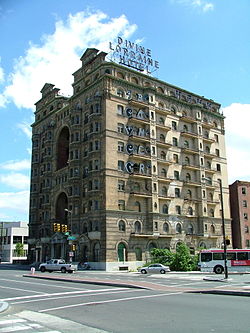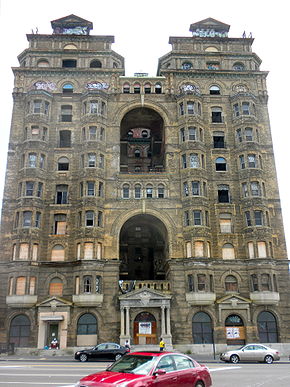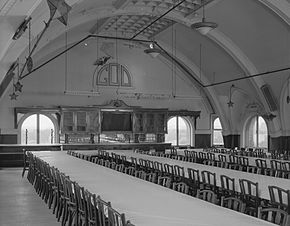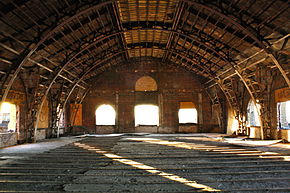- Divine Lorraine Hotel
-
Lorraine Apartments
Location: 699 North Broad Street, Philadelphia, Pennsylvania Coordinates: 39°57′59.68″N 75°9′37.49″W / 39.9665778°N 75.1604139°WCoordinates: 39°57′59.68″N 75°9′37.49″W / 39.9665778°N 75.1604139°W Built: 1892 Architect: Willis G. Hale
George F. Payne and CompanyArchitectural style: Late Victorian Governing body: Private NRHP Reference#: 02001427 [1] Added to NRHP: November 27, 2002 The Divine Lorraine Hotel, also known as the Lorraine Apartments, stands at the corner of Broad and Fairmount Streets in North Philadelphia, Pennsylvania. Designed by architect Willis G. Hale and built between 1892 and 1894, the building originally functioned as apartments, housing some of Philadelphia's wealthy residents. Lorraine Apartments is one of the most luxurious and best preserved late 19th century apartment houses in Philadelphia. In 1900 the building became the Lorraine Hotel when the Metropolitan Hotel Company purchased the apartments. Later it would become the first hotel in Philadelphia to be racially integrated under Father Divine.
Contents
Early history
Both the location of the building and the architecture itself reflect the changes that were occurring rapidly in the city of Philadelphia and in the country at the time. North Philadelphia of the 1880s attracted many of the city's nouveau-riche, those individuals who became wealthy as a result of the industrial revolution. The Lorraine was a place of luxurious living, providing apartments with new amenities such as electricity. In addition, the building boasted its own staff, eliminating the need for residents to have private servants. There was also a central kitchen from which meals were delivered to residents.
The Lorraine Apartments were also an architectural feat. Prior to this period, the majority of Philadelphia's buildings were low rise, generally being no more than three or four stories tall. Not only were construction materials and techniques not capable of supporting taller buildings, but the inconvenience of the many flights of stairs to get to higher floors in the absence of an elevator was significant. However, around the time of the industrial revolution, improvements in building materials enabled taller buildings.
The Lorraine, at ten stories tall, was one of the first high-rise apartment buildings in the city. The building's architect, Willis G. Hale, also designed an earlier high-rise apartment building at 22nd and Chestnut Streets, which stood from 1889 until its demolition in 1945. Hale designed many other buildings around the city, but quickly fell out of favor at the turn of the century when most patrons rejected his highly stylized Victorian designs for the sleeker style of modern skyscrapers, and most of his landmarks had been torn down after the Great Depression.
Father Divine and the Universal Peace Mission Movement
In 1948, the building was sold to Father Divine (aka George Baker or Reverend Major Jealous Divine) for $485,000. Father Divine was the leader of the Universal Peace Mission Movement. After purchasing the building, Father Divine renamed it the Divine Lorraine Hotel. His hotel was the first of its class in Philadelphia, or indeed in the United States, to be fully racially integrated.[2] The Divine Lorraine was open to all races and religions, men and women who were willing to follow the rules of the movement. Among others, the rules included no smoking, no drinking, no profanity, and no undue mixing of the sexes, with men and women residing on different floors of the building. Additionally, guests and residents were expected to uphold a certain level of modesty, meaning that women were expected to wear long skirts - pants were not allowed. Believing that all people were equal in the sight of God, Father Divine was involved in many social welfare activities as well. For example, after purchasing the hotel, several parts of it were transformed for public use. The 10th-floor auditorium was converted to a place of worship. The movement also opened the kitchen on the first floor as a public dining room where persons from the community were able to purchase and eat low-cost meals for 25 cents.
The Divine Lorraine received a historical marker from the Pennsylvania Historical and Museum Commission in 1994 and was listed on the National Register of Historic Places in 2002 as a site significant in terms of both architectural and civil rights history.
Recently
The building was closed in 1999 and sold in 2000 by the International Peace Mission. In May 2006 it was resold to Lorraine Hotel LP. to be converted into apartments. Development has stalled however, and the building remains in a dilapidated state, covered with graffiti, with windows boarded up or open to the weather.
The Universal Peace Mission Movement still exists in the form of a network of independent churches, businesses, and religious orders. Its followers operated another hotel, the Divine Tracy in West Philadelphia, but the building also was sold. It is in the process of being renovated, renamed "The Stratum," and may again serve as apartments.
References
- ^ "National Register Information System". National Register of Historic Places. National Park Service. 2007-01-23. http://nrhp.focus.nps.gov/natreg/docs/All_Data.html.
- ^ According to the state historical marker
External links
- Photoessay and history of the Divine Lorraine
- Father Divine's International Peace Mission Movement
- Philadelphia City Paper photo essay
- Listing and photographs at the Historic American Buildings Survey
- Photograph of the Divine Lorraine by James G. Mundie
U.S. National Register of Historic Places Topics Lists by states Alabama • Alaska • Arizona • Arkansas • California • Colorado • Connecticut • Delaware • Florida • Georgia • Hawaii • Idaho • Illinois • Indiana • Iowa • Kansas • Kentucky • Louisiana • Maine • Maryland • Massachusetts • Michigan • Minnesota • Mississippi • Missouri • Montana • Nebraska • Nevada • New Hampshire • New Jersey • New Mexico • New York • North Carolina • North Dakota • Ohio • Oklahoma • Oregon • Pennsylvania • Rhode Island • South Carolina • South Dakota • Tennessee • Texas • Utah • Vermont • Virginia • Washington • West Virginia • Wisconsin • WyomingLists by territories Lists by associated states Other  Category:National Register of Historic Places •
Category:National Register of Historic Places •  Portal:National Register of Historic PlacesCategories:
Portal:National Register of Historic PlacesCategories:- Buildings and structures completed in 1894
- Residential buildings in Philadelphia, Pennsylvania
- National Register of Historic Places in Philadelphia, Pennsylvania
- Hotels established in 1900
Wikimedia Foundation. 2010.




